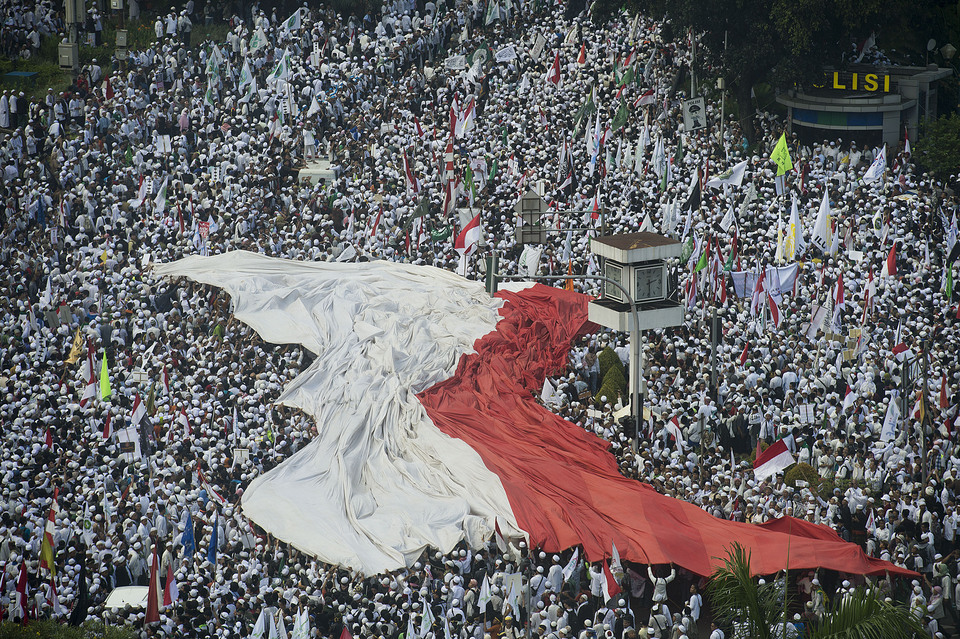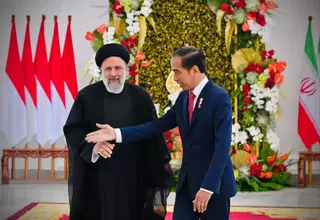Last week, around 200,000 people marched in Jakarta and other Indonesian cities to protest Chinese-Christian Jakarta Governor Basuki "Ahok" Tjahaya Purnama for allegedly “insulting Islam.”
The rally was organized by the Islamic Defenders Front (FPI), a hardline Islamic militia group, and was the biggest social mobilization in years. It was also the biggest rally the FPI had ever organized. The FPI, notorious for vigilante raids and attacking religious minorities, would normally only mobilize hundreds of protesters.
The rally was triggered by a video of Ahok criticizing his opponents for using Quran verses to warn against voting for him. The video went viral.
I followed the rally in Jakarta to understand the people participating in the rally and their motivations.
Conservative Muslims
From direct interviews with the participants, I found that many of the participants were from the middle class. They were professionals, businesspersons, teachers, and lecturers.
I also found that majority of them are members of majelis taklim (Islamic study groups) or majelis dzikir (Islamic prayer reciting groups) which not only came from Jakarta and its surrounding areas but also from outer Java. Many of them are not associated with the FPI or other Islamic vigilante groups. Most of them identify themselves as conservative Muslims and are against violent protests.
Their political orientations are diverse. They include supporters of the Islamic political parties, supporters of nationalist parties. Some were even supporters of the Indonesia Democratic Party of Struggle (PDI-P), the party endorsing Ahok in next year’s Jakarta gubernatorial race. Others had no political preference.
Some analysts argue the anti-Ahok rally was due to growing religious intolerance and the inability of the government to curb extremism. Others contend that Ahok’s policies on forced eviction have angered the poor, prompting them to join the protest against Ahok. Some, including the president, implied that “political actors” were behind the rally.
But looking at the character of the people who took part in the rally, their main interest is hardly in Jakarta’s local election or even in the Ahok administration’s policies.
I did meet participants who were victims of forced evictions under Ahok. But they claimed they took part in the rally as representatives of their majelis taklim. They said they were demanding Ahok to be jailed for blasphemy, not for his eviction policies.
They are motivated by the desire to defend Islam from alleged blasphemy. This, however, does not necessarily mean that religious intolerance is also growing. Existing explanations have missed a broader political context and historical analysis that makes multi-group mobilization under the banner of Islam possible.
I argue that such mobilization was possible as an outcome of the marginalization of the Islamist’s interests within formal politics during Jokowi administration.
The rally was a vehicle for Islamic groups to deliver their dissents to the state. Accusing Ahok of blasphemy was a trigger that mobilized such dissent.
A lot of protesters are members of conservative Islamic groups who were accommodated during the administration of former president Susilo Bambang Yudhoyono but now they feel that they have been excluded. Their interests are represented in the parliament by the Prosperous Justice Party (PKS), an opposition party whose current position is also weak.
In Indonesia, it has been common for the ruling power to win over conservative Muslim groups for their support. Since the 1990s, former president Suharto started to engage with conservative Muslims as a result of changing political alliance when the military support for him started to wane. Suharto, an adherent of Javanese mysticism, then presented himself and his family as true Muslims.
The same political approach was also employed by Yudhoyono during his administration.
Two of the groups that took part in the rally, Majelis Rosulullah (MR) and Majelis Dzikir Nurussalam (MDN) are Islamic reciting groups with thousands of members in Jakarta. These groups are close to Yudhoyono.
Yudhoyono is one of the founders of MDN. During his presidency, Yudhoyono routinely visited events held by these organizations usually held in Monas park close to the presidential palace in Jakarta.
In contrast, from the beginning of his presidency, President Joko "Jokowi" Widodo has not made any significant approach to this group, or sought their support. Jokowi has preferred to make a loose alliance with so-called moderate Islamic groups represented by two largest Muslim organizations, Nahdlatul Ulama and Muhammadiyah. Unlike more conservative Islamist groups, these moderate Muslims groups generally reject formal adoption of sharia law.
In the parliament, PKS was also excluded from Jokowi’s political alliance. In general, conservative Muslims have no place during Jokowi administration.
The same political approach was also applied by Jokowi when he was a governor of Jakarta. It has continued under Ahok. The fact that Ahok is from a Chinese-Christian cultural background has raised negative sentiment from Islamic groups.
From the start of Ahok’s administration, MDN and the FPI have protested against Ahok as an acting governor due to his religious background. MDN was also one of the organizations who insisted the Indonesian Ulema Council (MUI) to issue a fatwa (edict) regarding Ahok’s comments in September.
Meanwhile, MR was disappointed by Ahok’s policy banning dzikir akbar or a large gathering of prayer reciting in Monas park. Before Ahok, the group could always use the park for such an event. When the case was brought to the president, Jokowi preferred to support Ahok’s policy than MR’s complaints.
One of MR’s followers said to me that he joined the anti-Ahok rally because he was disappointed by what he saw as Ahok’s discrimination against MR. He said Ahok allowed an event to celebrate the new year held in Monas park while he prohibited the event for MR. They then drew the conclusion that Ahok is trying to discriminate against Muslims.
FPI's win
In the context of Jakarta election, there is no doubt that Ahok’s opponents gain political advantages from the rally.
But the biggest winner from the rally is the organizer, the FPI. Their success in galvanizing 200,000 people to rally will encourage a perception that the FPI is the organization able to represent and mobilize conservative Muslims. This increases FPI’s leverage as an Islamic vigilante organization. Once a fringe group, it may remain an important actor in Indonesian politics.
If conservative groups continue to feel marginalized and the FPI use these sentiments to band together against the government, another large demonstration could happen.
Abdil Mughis Mudhoffir is a PhD candidate in politics at the Asia Institute, University of Melbourne.























